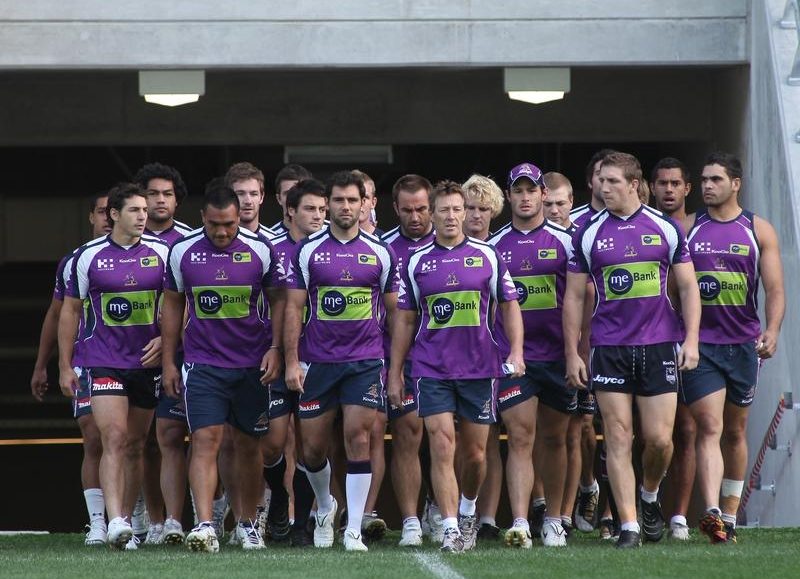
It’s been a decade since Melbourne coach Craig Bellamy led his players across AAMI Park in an act that continues to define the NRL club.
On April 22, 2010 – Melbourne were stripped of their 2007 and 2009 premierships, their 2006-08 minor premierships, their World Club Challenge title, fined $1.6 million, stripped of eight competition points and told they couldn’t play for any more points that season.
Captain Cameron Smith and superstar Billy Slater, among others, questioned if it was the end for the Storm.
Two days after the shock announcement the players assembled for their final training run before their annual Anzac Day clash with the Warriors.
Before training Bellamy led a march of unity across the field, flanked by his players, shoulder-to-shoulder.
Slater described it as an “iconic moment” for the Storm.
“There was still a genuine fear the club could go under,” Slater said in his autobiography.
“Craig wanted to show a united front.
“He told us to let the world know, ‘Whatever they throw at us, this group is sticking together’.”
Bellamy then delivered a three-minute address to the waiting media, his first since the salary cap scandal broke.
“We stand here today united … we ain’t gonna surrender,” Bellamy said.
“We have been gutted with what has transpired in recent days.
“Our greatest accomplishments and what we cherish most have been taken away.
“We will not walk away from this challenge … we will stand up for ourselves and fight our way back from here.
“That fight starts today. And tomorrow it starts on the field.”
A galvanised Melbourne won that game against the Warriors 40-6.
With acting CEO Matt Hanson one of the casualties amid the scandal fallout, and “chief rat” Brian Waldron already moved on, the Storm employed a new boss in Ron Gauci, who joined in July.
With a background in IT, Melbourne-born Gauci, described as a “transformation specialist”, had never worked in sport.
He said he was a “no data, no decision” type person.
But he told AAP when he saw the march he knew the Storm would again be a success.
“When I saw that image of the players in their jerseys behind Craig – that loyalty and commitment – that meant so much to me,” Gauci said.
“That’s one of the strongest images I’ve seen in all the years I’ve been following sport.
“For me it was a club who had been let down by poor management and governance and they deserved a chance to bounce back.”
Gauci said Melbourne’s decision to accept the NRL’s harshest penalties for salary cap breaches was the first step.
“There were those, in the minority, who thought we should have challenged the NRL and gone down the legal path but from my perspective a decision had been made and I wasn’t there to change it, I was there to make sure we moved on with the job of rebuilding the club,” Gauci said.
Gauci found most resistance came from Storm supporters, who accused him of being either an NRL insider or a plant by then-owner News Limited to shut down the club.
“I received a lot of animosity at the time,” he said.
“We told them we could get distracted and go down a path of destruction – two letters difference but one always leads to the other – or we focus on what lies ahead.”
Despite no points on offer, the Storm finished 2010 with 14 wins – 10 after the salary cap penalties were handed down – which would have been enough to play finals.
In their final regular-season game, a crowd of 20,517 turned out to watch them thump Newcastle 34-4.
“The way they played said something about the players and the football department and that put pressure on us as an administration to make sure we did the right thing by them,” Gauci said.
Bellamy switched their training and game plans to serious mode through that season as he was worried about what lay ahead.
“I knew that if we let our standards slip too far that year it would be too hard to come back in the years after,” Bellamy said at the time.
Gauci said it wasn’t easy with a number of club sponsors walking away but a breakthrough came when they landed Crown as a major sponsor for 2011.
Melbourne started that year without Test centre Greg Inglis, after he signed with Souths.
Ryan Hoffman, Brett Finch and Brett White were also among those to depart as the Storm shed $1 million worth of talent to get under the cap.
But they had some exciting talent coming through including Gareth Widdop and Jesse Bromwich, who played in their champion 2009 under-20 team.
Melbourne won the minor premiership but fell to the Warriors in the preliminary final.
A year later they made no mistake, beating Canterbury in the NRL grand final.
They have played in every finals series since, reached three further grand finals and claimed the 2017 title.
According to 2019 figures, the Storm have the fourth-most members in the NRL and are also in the top four for game attendance.
Gauci, who left the club when it was sold in 2013, puts it down to people and culture.
He pointed to Bellamy, chief executive Dave Donaghy, football manger Frank Ponissi and chairman Bart Campbell as the critical pillars.
“I’d like to think that the club was successful before I arrived and we hit that speed bump,” Gauci said.
“I’d like to think by the time I left that we were far more successful than the club I found during the salary cap saga.
“And the club today is far more successful again. They have taken it to another level.
“But I’d like to think we laid some of the platform for that.”




